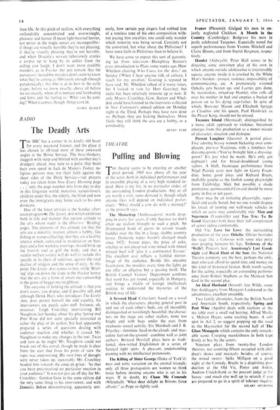THEATRE
Puffing and Blowing
THE theatre seems to be entering on another great period; 1965 was above all the year of the actor, both in individual performances and in ensemble playing of a very high standard in- deed. Here is my list, in no particular order, of the outstanding London productions. Any or all are worth a visit, sonic demand it, though which anyone likes will depend on individual prefer- ences: 'What should a cow do with a nutmeg?' as the proverb says.
The Mousetrap (Ambassadors): worth drop- ping in every few years, if only because we don't often see realism brought to such a pitch. An ill-tempered band of guests in sat-out tweeds huddles over the fire in a large, shabby country house. Domestic topics haven't changed much since 1952: frozen pipes, the price of coke, whether or not cheap red wine mixed with tinned minced beef will 'give it a continental flavour.' The excellent cast reflects a faithful mirror- image of the audience. Beside this uncanny fascination, the murders every time the lights go out offer an effective but a passing thrill. The British Council Visitors' Department confirms that word has got round, especially in Hungary, and brings a trickle of foreign intellectuals seeking to understand the mysteries of the British way of life.
A Severed Head (Criterion): based on a novel in which the characters, playing general post in and out of each other's beds, are all incredibly distinguished or ravishingly beautiful; the charac- ters on the stage are sober realists, none too bright and with bags under the eyes from strenuous sexual activity. Iris Murdoch and J. B. Priestley—feminine head-in-the-clouds and mas- culine feet-on-the-ground--combine well as joint authors. Bernard Horsfall plays hero as tradi- tional, slow-witted Englishman in a series of farcical tight spots. A pleasant, undemanding evening with no intellectual pretensions.
The Killing of Sister George (Duke of York's): neat and witty variation on the eternal triangle; only all three protagonists are women so think twice before inviting anyone who is set in his ways. If in doubt, try Chase Me Comrade (Whitehall). 'What dear delight to Britons farce affords!' as Pope so rightly said. Ivanov (Phoenix): Gielgud his men in un- justly neglected Chekhov. A Month in the Country (Cambridge): Redgrave his men in justly celebrated Turgenev. Especially noted for superb performances from Yvonne Mitchell and Claire Bloom, and from Ingrid Bergman, respec- tively.
Hamlet (Aldwych): Peter Hall seems to be directing some unwritten play of his own in which anyone outside adolescence is irretrievably square, anyone inside it is crushed by the White Man's burden—protest, violence, impossibility of communicating, etc. A prematurely wizened Ophelia gets beaten up, and Laertes gets done, by inarticulate, mixed-up Hamlet, who rolls all over his mother in bed and empties a bucket of poison on to his dying step-father. In spite of which, Brewster Mason and Elizabeth Spriggs as Claudius and his queen, Paul Hardwick as the Player King, should not be missed.
Treasure Island (Mermaid): distinguished by a more adult approach to violence. Stevenson emerges from this production as a minor master of character, situation and dialogue.
Present Laughter (Queens): A period piece. Five adoring brassy women bickering over com- placent, pre-war Narcissus, with a fondness for dressing-gowns ('You've brought him a dressing- gown? It's just what he needs. He's only got eighteen') and for broad-shouldered young sailors. A bluff, Juanesque performance from Nigel Patrick casts new light on Garry Essen- dine. Some good jokes and Richard Briers, ineffably gauche as the foolish young playwright from Uckbridge. Slick but possibly a shade premature; quintessential Coward should be more gamy in five or ten years.
Shaw may be an irritating playwright, super- ficial and easily bored, but no one would dispute his knack of turning out well-made vehicles in which an actor may comfortably ride Man and Superman (Vaudeville) and Too True To Be Good (Garrick) both have their full complement of actors riding comfortably.
• Old Vic: Love for Love: the outstanding production of the year. Othello: Olivier bestrides the stage like a Colossus with sonic nice petty men peeping between his legs. Trelawny of the 'Wells': Pinero's best. Armstrong's Last Good- night and Royal Hunt of the Sun: the National Theatre company are the best, perhaps the only, men who can afford to spend time and money on this kind of historical fustian. Both worth seeing for the acting, especially an astounding perform- ance from Robert Stephens as the Mexican Sun God in the second play.
An Ideal Husband (Strand): late Wilde, sonic fine skulduggery from Margaret Lockwood as the adventuress, excellent ensemble.
Two family chronicles, from the British North and American South, respectively: Spring and Port Wine (Apollo) deals with ructions at the tea table over a small red herring. Alfred Marks v. Melvyn Hayes, some exciting bouts. A soft spot in Act 2, so suggest popping up the road to the Haymarket for the second half of The Glass Menagerie which contains the only remark- able scene. Creeping mawkishness in both kept firmly at bay by the actors.
Nineteen plays from twenty-five London theatres, not counting fifteen occupied with chil- dren's shows and musicals; besides, of course, the mixed sweets—Spike Milligan on a good night at the Comedy, Brecht in a dispiriting pro- duction at the Old Vic, Pinter and Arden, Andrew Cruickshank as the peccant judge at the Savoy—and much else well up to scratch if you are prepared to go in a spirit of tolerant inquiry.
HILARY SPURLIN6






























 Previous page
Previous page